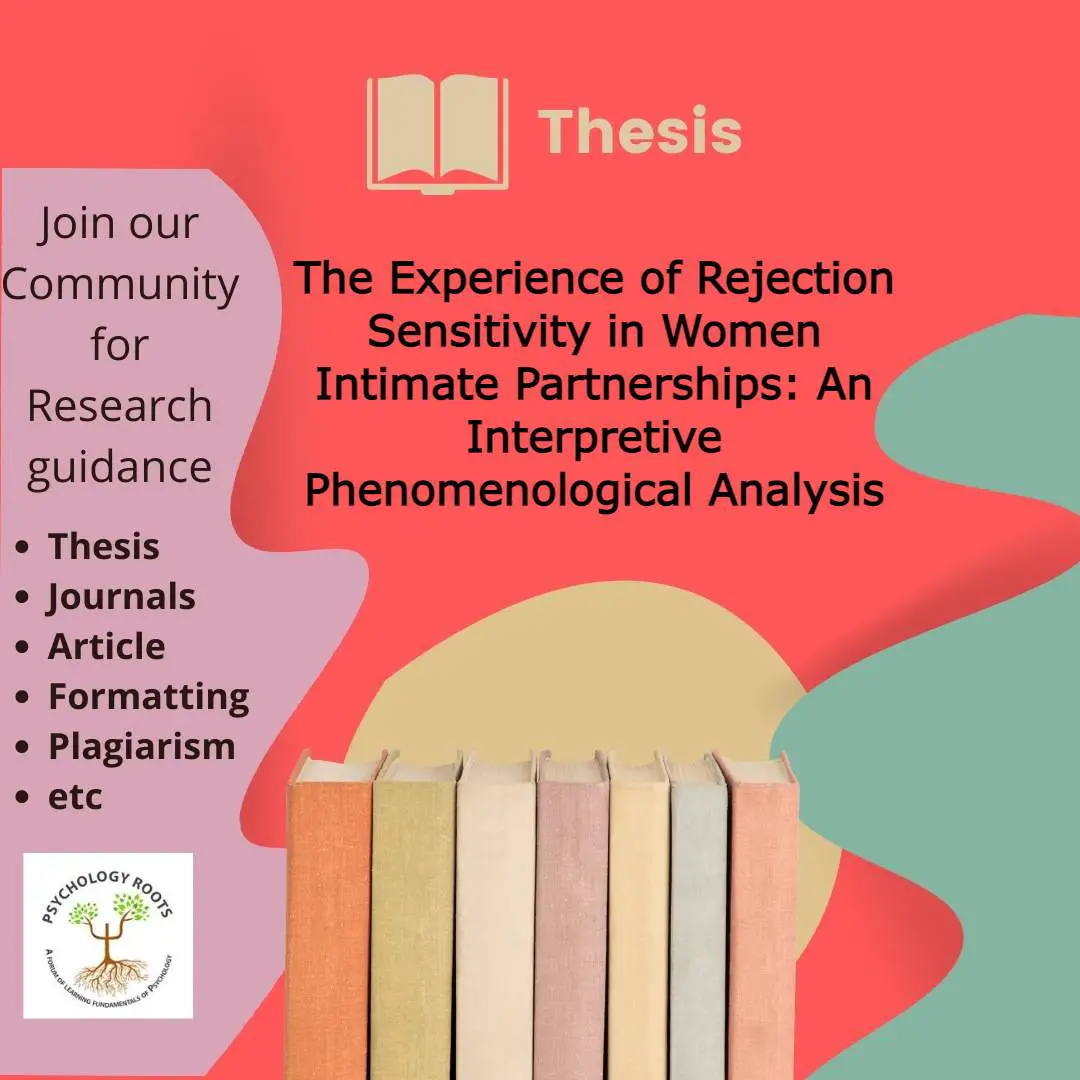Table of Contents
The Experience of Rejection Sensitivity in Women Intimate Partnerships: An Interpretive Phenomenological Analysis
Here in this post, we are sharing the full Psychology thesis on “The Experience of Rejection Sensitivity in Women Intimate Partnerships: An Interpretive Phenomenological Analysis“. You can read the abstract of the thesis with a download link. We have thousands of thesis in our collection (See articles). You can demand us any article related to psychology through our community, and we will provide you within a short time. Keep visiting Psychology Roots.
Abstract of the thesis
The theory of rejection sensitivity, suggests that early experiences of rejection (e.g. parental rejection, peer rejection) can result in the tendency to anxiously expect, readily perceive, and overreact to rejection by significant others in future relationships. An abundance of quantitative research has suggested that rejection sensitivity has significant implications regarding one’s thoughts and actions within intimate partnerships (e.g. Downey & Feldman, 1996); however, little is known about the lived experience of the women who are sensitive to rejection. The present research sought to move beyond the developmental perspective of the theory of rejection sensitivity (as presented in the first two chapters) by aiming to gain an understanding of how women experience rejection sensitivity within their intimate partnerships and how their thoughts, feelings, and behaviours have impacted their romantic lives.

The Experience of Rejection Sensitivity in Women Intimate Partnerships: An Interpretive Phenomenological Analysis
Interpretive Phenomenological Analysis (IPA) was used to explore the lived experience of women who identified with rejection sensitivity. Data generated during two interviews with three participants was transcribed and analyzed using an interpretive phenomenological analysis approach. An over-arching theme of I won’t let it happen again: a journey of self-protection emerged that was representative of the women’s shared experience of protecting themselves from experiencing further rejection in their romantic relationships and was further illustrated throughout three secondary themes: I can control things so I won’t let it happen again, Wait…is it happening anyway?, and A continuous journey.
Based on the present findings, considerations for further research and practice are offered. Given lack of research aimed at understanding the experiences of women who identify with rejection sensitivity, the value of the present study is twofold: This research makes a notable contribution to current literature, but also encourages women, and those devoted to helping them, to understand their own unique relationships with rejection sensitivity and navigate their own journeys with a sense of hope for mutually satisfying and beneficial romantic relationships in their futures.
Researcher of the Thesis
- Amanda Merkosky
Avail Thesis [sociallocker id=64051]
[/sociallocker]
Need help in Research:
Are you struggling in research? Don’t Worry, We provide you with complete guidance and support free and quickly. Just need to create a query in our community. We also offer paid services such as:
- Thesis writing
- Article writing
- Statistical analysis
- Reference according to APA
- APA Formatting
- Supervisions
- Courses and Training
Contact us for the best quality free and paid services. info@psychologyroots.com or (+92-3336800644)
Information:
The purpose of our website is only to help students to assist them in finding the best suitable instrument for their research especially in Pakistan where students waste a lot of time in search of the instruments. It is totally free of cost and only for creating awareness and assisting students and researchers for good researches. Moreover, it is necessary for you to take the permission of scales from their representative authors before use because copyrights are reserved by the respected authors.
Help Us Improve This Article
Did you find an inaccuracy? We work hard to provide accurate and scientifically reliable information. If you have found an error of any kind, please let us know.
Add comment. we appropriate your effort.
If you have any scale or any material related to psychology kindly share it with us at psychologyroots@gmail.com. We help others on behalf of you.
Follow